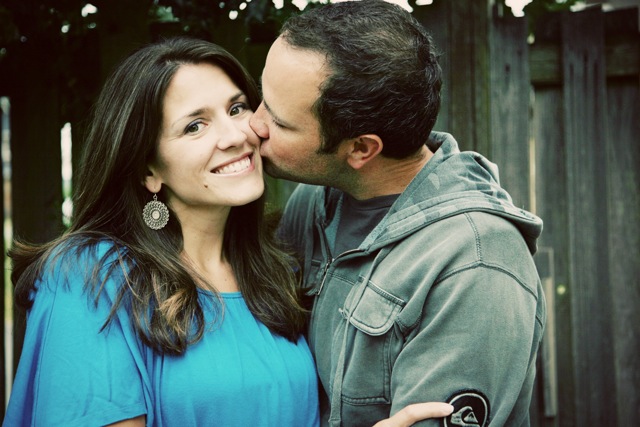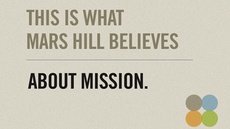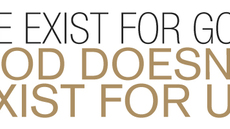From Pastor Jamie:
Crystal and I got married when I was 21. I wanted to marry her for many reasons, but God had an even fuller plan to give me what I wanted and what I needed: He gave me a loving wife, a fun friend, and a sanctifying partner to live life with. She’s been a gift of grace to me for all of our 11 years together.
I’ve also seen God use Crystal as an agent of grace in the lives of many women. A few years ago, she gave a talk about gluttony at a Mars Hill Women’s Training Day. Women from all over the world have sent notes of encouragement on how Jesus has used this teaching to help change their lives. Just this month we received a handwritten note from a woman in Ireland blessed by Crystal’s teaching.
Body image and eating disorders haunt countless women. It’s a topic that doesn’t get enough gospel; instead, it’s dealt with through tips and tricks, diets and exercise plans. Many of these methods are not wrong, but they are void of Jesus and never get to the heart of the issue.
Regardless of whether or not this is something you struggle with, I’d encourage you to listen to this heart-rending look at a sin that is commonly glossed over within the church, and inappropriately understood by the world.
Here is an excerpt from the beginning of that talk:
*
Gluttony
Crystal Munson, January 2007
For the majority of my life, weight and food, has been the focus of my thinking and an idol that has stood between me and God.
“For many, of whom I have often told you and now tell you even with tears, walk as enemies of the cross of Christ. Their end is destruction, their god is their belly, and they glory in their shame, with minds set on earthly things.”Philippians 3:18-19
The first thing that to notice is that this verse doesn’t say anything about size or weight or calorie intake, it says nothing about physical appearance, which is what we tend to associate gluttony with. We automatically think, “glutton = you’re fat.” From this verse, we see that instead of focusing on our physical appearance, it focuses on our attitude toward the cross of Christ, who we worship, and what we think about.
The last time I spoke about gluttony, I just used Webster’s dictionary definition of gluttony: “habitual overeating.” And that’s true, but it really falls short to me because it doesn’t address at all the heart behind the overeating. And overeating in itself needs a definition, because what is too much food for me may not be for a 6’5" football player. That’s when I realized, maybe instead of trying to look to Webster’s for a definition, maybe I should look to God and how he defines gluttony, and the Philippians verse was a really good job of that and was greatly convicting to me.
The other reason I don’t want to define gluttony just in terms of “overeating” is that it’s too easy for us to get bogged down in legalism and in a false sense of control where we think, if we just control what we’re eating, then that’s what God wants and that puts us in a righteous spot before him. So, I wanted to get away from just that definition of overeating and really focus on what’s going on in our hearts.
The Narcissism of Diet Programs
Keeping that Philippians verse in mind, here are three slogans from three of the top weight-loss companies, and see what a different vibe you get, compared to the convicting vibe I, and maybe you, got from Philippians:
“Become your own success story.” –Jenny Craig
“You lose the weight and not the lifestyle.” –LA Weight Loss Systems
“It’s your lifestyle, and your choice.” –Weight Watchers
Those slogans are focusing on your future success. They’re focusing on your ability to chose what works best for you. Compared to the Philippians verse, I get a warm, fuzzy feeling from those slogans, they really make you think, Wow, yeah, I can be successful and create my own success story, and I won’t have to really give up my lifestyle, I’ll just lose weight. And those kinds of invitations to become “successful” – which really just means “thin” – and in control of your eating, that is how the culture handles the issue of overeating. They tell us what our itching ears want to hear. We want to hear that we can be thin and successful and be in control of our eating and choose what works best for us.
These programs will not tell you that you’re overweight because of a sin. They’re not gonna tell you that you need God to transform your heart.
And the problem with this approach is that we will spend all of our time and all of our money and our emotions pursuing this dream of a better, thinner you, and we won’t leave any room for God.
These programs will not tell you that you’re overweight because of a sin. They’re not gonna tell you that you need God to transform your heart. They will tell you, “You just need more information and you need a plan that fits your lifestyle.” And those are just three slogans of hundreds of companies whose slogans stood out to me as completely going against what we will find if we look at the Bible.
First, I want to give you a glimpse into my background.
Read more from Crystal and hear the talk in full, after the jump:
“I would go to bed at night praying that God would make me thin, and of course I would wake up the next morning in a fat body.”
I’m 29 and I don’t remember a time in my life when I wasn’t consumed with my weight and with food.
I remember feeling “too big” as early as first grade, and I was very self-conscious that I was the biggest girl in my class. I look back at pictures now, and I wonder, Where did I get that from? I look like a normal first grader. But, regardless of where it came from, that’s how I felt about my body. I’ve always been very embarrassed about my weight. I’ve struggled with comparing myself to my sister, my friends, my friends’ sisters, my sister’s friends. Any woman, any girl who was out there, my first meeting of them would be a comparison of what their body looked like and how mine didn’t measure up.
Some of my earliest memories are sneaking food and lying to my parents about food and feeling ashamed about what I ate. And as I got into junior high, this dream of becoming a thin, beautiful person was a fantasy to me that was like an addiction, and I would think about it all the time. I would go to bed at night praying that God would make me thin, and of course I would wake up the next morning in a fat body.
“I never doubted that God would give me a husband, but I always assumed that I would have to be thin first because ‘guys don’t date fat girls.’”
And at this point, it wasn’t an imagination, I really was overweight. And it didn’t matter that I was smart, funny, had plenty of friends, hardworking, got good grades. None of that really mattered because being fat was the defining factor in my life, and it overshadowed everything.
I would constantly set goals about when I would finally be skinny. In junior high, I thought, There is no way that I can enter high school being overweight. And each year in high school, the summer would come, and I would think, This is the summer that I’m gonna lose weight, and I’m gonna come back and everybody is going to be so impressed with how thin and beautiful I am.
Well none of that happened. I went to my high school graduation overweight and decided, OK, well, college. That’s the time. I can’t start college unless I lose weight. And another deadline passed me by.
I was convinced that I would be married someday. I never doubted that God would give me a husband, but I always assumed that I would have to be thin first because “guys don’t date fat girls.” And that’s what I believed and it was based on past history that I didn’t have boyfriends in junior high and high school.
But God, in his grace, brought me my husband who loved me and asked me to be his wife. And my wedding day came and went, and I entered my marriage without telling Jamie how obsessed I was with thoughts of being thin and definitely without telling him how much I ate.
To hear the whole story of how God redeemed Crystal from this sin, click the player below:
Crystal Munson and her husband Jamie, Mars Hill’s lead pastor, are members of the Ballard campus.












